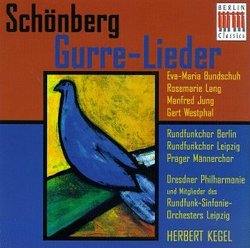| All Artists: Arnold Schoenberg, Herbert Kegel, Dresden Radio Symphony Orchestra & Chorus, Eva-Maria Bundschuh, Manfred Jung, Wolfgang Appel Title: Schonberg: Gurre Lieder Members Wishing: 0 Total Copies: 0 Label: Berlin Classics Release Date: 9/16/1997 Genre: Classical Styles: Opera & Classical Vocal, Symphonies Number of Discs: 2 SwapaCD Credits: 2 UPC: 782124901721 |
Search - Arnold Schoenberg, Herbert Kegel, Dresden Radio Symphony Orchestra & Chorus :: Schonberg: Gurre Lieder
 | Arnold Schoenberg, Herbert Kegel, Dresden Radio Symphony Orchestra & Chorus Schonberg: Gurre Lieder Genre: Classical
|
Larger Image |
CD Details |
CD ReviewsMost atmospheric recording of this piece! Alexander Z. Damyanovich | Flesherton, Ontario, Canada | 12/17/2001 (5 out of 5 stars) "All right, since this review doesn't allow me to give the 4.5 stars this recording deserves when everything's fairly weighed, it may as well get the full five (5). What are my reservations? 1) The lack of a libretto translation in any language (only the German original is included), 2) a very few of the details could have been better-captured had more microphones and editing been used and 3) some people want things to move more. While I personally disagree on the last point - for me, this is very, very close to being as ideal an interpretation as one can get - this last observation can't be ignored. As to point 2), this seems largely based on as few takes and equipment set-up as possible (though the result is sumptuous for what it is nevertheless!): there are a few points where some flaws in the strings appear, and a place here and there where a detail or two (e.g., the oboes & clarinets around bar 15 of Part II) could have been better brought out instead of being drowned-out by someone else (e.g., the horns in the same place). Still, all of these are small flaws in a performance that truly is otherwise as good as any - and by now this reviewer has heard parts of competing recordings by Gielen {this one is on its way to getting known to me in its entirety}, Chailly, Boulez, Rattle, Levine and Sinopoli as well as Ozawa). Yes, one may pick on Manfred Jung as not being quite a Ben Heppner or Lauritz Melchior (which the rôle of Waldemar, being true Heldentenor territory à la Tristan or Siegfried, ideally needs), but his work otherwise leaves nothing to be desired. [He actually frequently served as a Heldentenor in German opera-theatres (including Bayreuth!) and concert-halls, and his experience clearly shows. The only real Heldentenor that truly excels over him beyond all doubt is Ben Heppner for Levine; however, the Munich Philharmonic is just marginally inferior on the Oehms set, while Eva-Maria Bundschuh is not at all inferior when compared to the more-acclaimed Deborah Voigt.] Otherwise, now that the negatives are pretty well out of the way, congratulations to everybody concerned. All of the soloists are very good indeed and committed; the choirs are most convincing with both the male-chorus parts of Waldemar's men and later with the grand finale; and the orchestra (neither of the two component orchestras being all that famous to boot!) does superbly with the exception of those few minor weaknesses mentioned above. For me, Eva-Maria Bundschuh is a special standout as the soprano playing the part of the ill-fated heroine Tove - what a voice (she actually beats both Karita Mattila and Melanie Diener)! All of these are conducted most superbly by a conductor who goes even further than the late Giuseppe Sinopoli in attaining the full ripeness, ardency, and tenderness this score evokes - everything that's lacking with Seiji Ozawa's mundane reading, my previous standard, is here! Herbert Kegel's empathy with this score, giving it the true spaciousness (without however lacking a true sense of drive nonetheless) required (especially in the love-music of Part I; also, note the 2 or 3 Luftpausen in the same part, how he handles them - an object lesson on how to have such music breathe!!!) in itself deserves the full 5 stars! [Not to mention the fabulous acoustic afforded by Dresden's Lukaskirche (Church of St.Luke) - appropriately spacious for such a superwork!] All in all: yes, Ozawa's recording, issued at bargain price and with the coupling of both of Schoenberg's Chamber Symphonies, can appear attractive; however, that entails false economy given the pedestrian nature of his performance. [Those who want a bargain-set including other works would do better to look at Boulez or Chailly (especially the latter given his stellar singers like Siegfried Jerusalem, Susan Dunn and - especially - Brigitte Fassbaender (so far the best Wood-Dove I've ever heard!!).] Overall, while one can pick upon one or more singers (or other things!) in pretty well ANY of the sets currently available, one also needs to consider the net-result being worse than, equal to or better than the sum of its parts. On this most critical of tests, this recording is as good as any out there. Yes, get the libretto translation via the Internet or elsewhere (a couple are readily available out there!) and then go for the Kegel recording hereby reviewed without hesitation. Warmly recommended!!" Don't be afraid of Schoenberg! Hugh H Bryan | Philadelphia, PA | 03/14/2000 (4 out of 5 stars) "This is a fabulous, late romantic work that all classical music lovers will enjoy. Schoenberg wrote this over a period of years, beginning before his transition to atonal music. Gurre-Lieder dabbles in dissonances, but is, for the most part a massive dramatic work that's easy to listen to and enjoy. This recording has great balance of the ensemble allowing the listener to clearly hear everything they should. The insert includes the text of the songs, which unfortunately are only in German. This piece is more entertaining if you understand the words that are being sung, so this is unfortunate."
|

 Track Listings (12) - Disc #1
Track Listings (12) - Disc #1